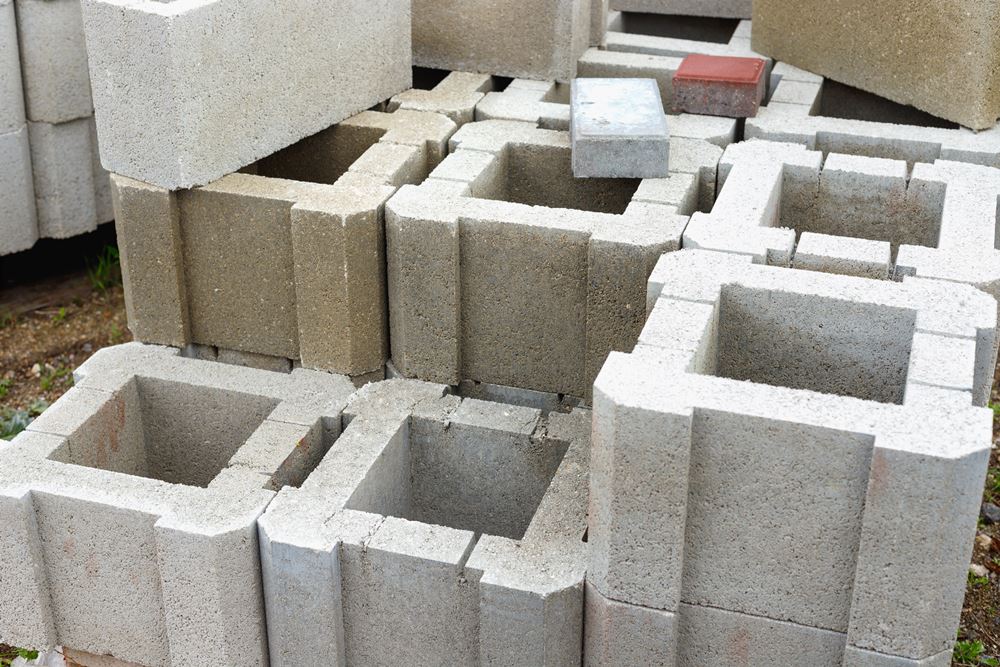In the construction field, choice of materials plays a pivotal role in the durability, efficiency, and cost-effectiveness of any project. Among the various materials available, cinder blocks, cement blocks, and concrete blocks stand out as essential components and cost-efficient alternatives to natural stone. Each type of block has unique properties and applications, and each meets different construction needs.
Cinder Blocks: Lightweight and Versatile
Cinder blocks, known for their lightweight nature, have been a staple in construction for many years. Historically made from a combination of concrete and cinders—residue from burned coal—these blocks are less dense than their concrete counterparts. This characteristic makes them easier to handle and install, which can significantly reduce labor costs and construction time.
Applications:
- Non-Load-Bearing Walls: Cinder blocks are commonly used for interior partition walls and other non-load-bearing applications. Their light weight makes them ideal for structures that do not require high strength.
- Garden Walls: In landscaping, cinder blocks are used to construct garden walls and other decorative elements. Their ease of use and aesthetic appeal make them a popular choice for outdoor projects.
- Small Structures: They are also used in building small sheds, garages, and other lightweight structures. Their ease of manipulation makes them suitable for DIY projects.
- Fire Pits and Outdoor Fireplaces: Cinder blocks’ resistance to heat makes them a good choice for constructing fire pits and outdoor fireplaces.
While cinder blocks are not as strong as concrete blocks, their versatility and ease of use make them a valuable resource in specific construction scenarios.
Cement Blocks: Ideal for Landscaping
Cement blocks, often referred to as concrete masonry units (CMUs), are another cornerstone of the construction industry. These blocks are made from a mixture of cement, water, and aggregates such as sand, gravel, or crushed stone. The resulting product is a strong, durable block that can be used in a wide range of applications.
Applications:
- Foundation Walls: Cement blocks provide a solid and stable base for buildings, ensuring structural integrity from the ground up.
- Retaining Walls: Their strength makes them ideal for retaining walls, which are used to hold back soil and prevent erosion.
- Fireproof and Soundproof Walls: Cement blocks are often used to construct fireproof and soundproof walls, enhancing the safety and comfort of buildings.
- Load-Bearing Walls: These blocks can support significant weight, making them suitable for load-bearing walls in both residential and commercial buildings.
- Exterior and Interior Walls: Cement blocks are used for constructing durable exterior walls and sturdy interior partitions.
The strength and versatility of cement blocks make them a preferred choice for many construction projects, providing both structural support and enhanced safety features.
Concrete Blocks: A Strong Foundation
Concrete blocks are renowned for their exceptional strength and durability, making them indispensable in high-stress construction environments. Made from a mixture of cement, water, and aggregates, concrete blocks are designed to withstand significant loads and harsh conditions.
Applications:
- Commercial Buildings: Concrete blocks are extensively used in constructing large commercial buildings, such as offices, shopping centers, and industrial facilities. Their strength ensures the stability and longevity of these structures.
- Residential Buildings: In residential construction, concrete blocks are used for building homes, especially for load-bearing walls and foundations. They provide a sturdy and reliable framework for housing projects.
- Industrial Buildings: Factories and warehouses benefit from the robustness of concrete blocks, which can endure heavy machinery and constant wear and tear.
- Retaining Walls and Sound Barriers: Concrete blocks are used in large-scale landscaping and civil engineering projects, such as retaining walls and sound barriers along highways and railways.
- Firewalls and Storm Shelters: Their fire-resistant properties make concrete blocks ideal for constructing firewalls within buildings. Additionally, their strength and durability make them suitable for building storm shelters that can withstand extreme weather conditions.
Concrete blocks are the epitome of reliability and strength in the construction industry, supporting the creation of safe and enduring structures.
Cinder blocks, cement blocks, and concrete blocks each play a crucial role in the construction industry, offering unique properties that cater to different project needs. Cinder blocks provide a lightweight and versatile solution for non-load-bearing applications and decorative elements. Cement blocks offer a balance of strength and versatility, making them suitable for a wide range of structural and safety-related applications. Concrete blocks stand out for their unparalleled strength and durability, supporting the construction of robust and resilient buildings.
Understanding the specific advantages and applications of each type of block allows builders to make informed decisions that enhance the quality, efficiency, and longevity of their construction projects. As the foundation of modern construction, these blocks continue to shape the built environment, ensuring that structures are safe, durable, and fit for their intended purposes.

